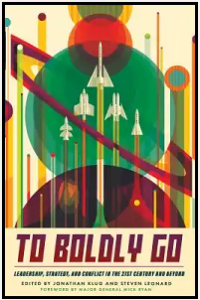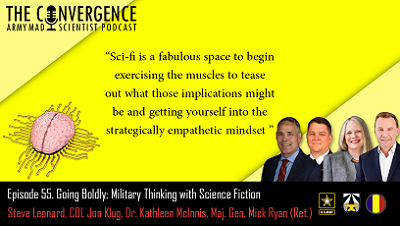[Editor’s Note: Army Mad Scientist is pleased to present our latest episode of The Convergence podcast, featuring COL Jonathan Klug, Steve Leonard, Dr. Kathleen McInnis, and Maj. Gen. Mick Ryan discussing the lessons captured in the book To Boldly Go; leadership, strategy, and conflict; the importance of storytelling; and the value of science fiction — Enjoy!]
[If the podcast dashboard is not rendering correctly for you, please click here to listen to the podcast.]

To Boldy Go, edited by COL Jonathan Klug and Steven Leonard, and published by Casemate Publishers in 2021, is subtitled “Leadership, Strategy, and Conflict in the 21st Century and Beyond.” Army Mad Scientist’s The Convergence podcasters Luke Shabro and Matthew Santaspirt explore how science fiction can inform the Army about the Operational Environment and the changing character of warfare with the books co-editors and contributors:
 COL Jonathan Klug is a U.S. Army Strategist serving as an Assistant Professor in the Department of Strategy, Planning, and Operations at the U.S. Army War College. Commissioned as an Armor officer, he served in Haiti, Bosnia, South Korea, Egypt, and Iraq. His strategy assignments included writing U.S. Army, U.S. Joint, and NATO Joint counter-insurgency doctrine; teaching at the U.S. Air Force Academy and the U.S. Naval Academy; serving as V Corps Deputy Plans and Strategy Officer; and strategic planning in the NATO Training Mission-Afghanistan, International Security Assistance Force Joint Command, and Operation Resolute Support Headquarters. He holds degrees from the U.S. Military Academy, Louisiana State University, and the U.S. Army School of Advanced Military Studies. He is a PhD candidate in Military and Naval History at the University of New Brunswick. COL Klug co-edited To Boldly Go and co-authored “Yours Is the Superior” with Steven Leonard (below), and contributed “You Rebel Scum!” and “To Live and Die at My Command.”
COL Jonathan Klug is a U.S. Army Strategist serving as an Assistant Professor in the Department of Strategy, Planning, and Operations at the U.S. Army War College. Commissioned as an Armor officer, he served in Haiti, Bosnia, South Korea, Egypt, and Iraq. His strategy assignments included writing U.S. Army, U.S. Joint, and NATO Joint counter-insurgency doctrine; teaching at the U.S. Air Force Academy and the U.S. Naval Academy; serving as V Corps Deputy Plans and Strategy Officer; and strategic planning in the NATO Training Mission-Afghanistan, International Security Assistance Force Joint Command, and Operation Resolute Support Headquarters. He holds degrees from the U.S. Military Academy, Louisiana State University, and the U.S. Army School of Advanced Military Studies. He is a PhD candidate in Military and Naval History at the University of New Brunswick. COL Klug co-edited To Boldly Go and co-authored “Yours Is the Superior” with Steven Leonard (below), and contributed “You Rebel Scum!” and “To Live and Die at My Command.”
 Steven Leonard is an award-winning faculty member at the University of Kansas, where he chairs graduate programs in Organizational Leadership and Supply Chain Management. As a former military strategist and the creative force behind the defense microblog Doctrine Man, he is a career writer and speaker with a passion for developing and mentoring the next generation of thought leaders. He is a senior fellow at the Modern War Institute at West Point; the co-founder of the national security blog Divergent Options; co-founder and board member of the Military Writers Guild; and a member of the editorial review board of the Arthur D. Simons Center‘s Interagency Journal. He is the author, co-author, or editor of five books, numerous professional articles, countless blog posts, and is a prolific military cartoonist. Mr. Leonard co-edited To Boldly Go and co-authored “Yours Is the Superior” with COL Klug (above), and contributed “Beware the Beast Man” and “The Mirror Crack’d.”
Steven Leonard is an award-winning faculty member at the University of Kansas, where he chairs graduate programs in Organizational Leadership and Supply Chain Management. As a former military strategist and the creative force behind the defense microblog Doctrine Man, he is a career writer and speaker with a passion for developing and mentoring the next generation of thought leaders. He is a senior fellow at the Modern War Institute at West Point; the co-founder of the national security blog Divergent Options; co-founder and board member of the Military Writers Guild; and a member of the editorial review board of the Arthur D. Simons Center‘s Interagency Journal. He is the author, co-author, or editor of five books, numerous professional articles, countless blog posts, and is a prolific military cartoonist. Mr. Leonard co-edited To Boldly Go and co-authored “Yours Is the Superior” with COL Klug (above), and contributed “Beware the Beast Man” and “The Mirror Crack’d.”
 Dr. Kathleen McInnis has worked in the Pentagon, the UK Parliament, and in think tanks on both sides of the Atlantic. Having earned her PhD in War Studies at King’s College London, she currently analyzes International security and defense issues for the U.S. Congress at the Congressional Research Service. The author of over fifty publications on international security matters, she has commented on international affairs on outlets including CNN, Sky News, BBC, Al Jazeera English, and the Voice of America. She is also the author of two books. Dr. McInnis contributed “Sun-Tzu, Ender, and the Old Man.“
Dr. Kathleen McInnis has worked in the Pentagon, the UK Parliament, and in think tanks on both sides of the Atlantic. Having earned her PhD in War Studies at King’s College London, she currently analyzes International security and defense issues for the U.S. Congress at the Congressional Research Service. The author of over fifty publications on international security matters, she has commented on international affairs on outlets including CNN, Sky News, BBC, Al Jazeera English, and the Voice of America. She is also the author of two books. Dr. McInnis contributed “Sun-Tzu, Ender, and the Old Man.“
 Maj. Gen. Mick Ryan is a retired Australian Army officer. A combat engineer, he has commanded tactical units at the troop, squadron, regiment, task force, and brigade levels. He is a veteran of East Timor, Iraq, and Afghanistan, and served on the Pakistan-Afghanistan Coordination Cell in the U.S. Joint Staff. A distinguished graduate of Johns Hopskins University and the U.S. Marine Corps (USMC) Staff College, and graduate of the USMC School of Advanced Warfare, he is an enthusiastic writer, reader, and a passionate advocate of professional education and lifelong learning. Maj. Gen. Ryan contributed both the Foreword and “From Tactics to Galactic Grand Strategy.”
Maj. Gen. Mick Ryan is a retired Australian Army officer. A combat engineer, he has commanded tactical units at the troop, squadron, regiment, task force, and brigade levels. He is a veteran of East Timor, Iraq, and Afghanistan, and served on the Pakistan-Afghanistan Coordination Cell in the U.S. Joint Staff. A distinguished graduate of Johns Hopskins University and the U.S. Marine Corps (USMC) Staff College, and graduate of the USMC School of Advanced Warfare, he is an enthusiastic writer, reader, and a passionate advocate of professional education and lifelong learning. Maj. Gen. Ryan contributed both the Foreword and “From Tactics to Galactic Grand Strategy.”
In today’s interview, COL Jonathan Klug, Steve Leonard, Dr. Kathleen McInnis, and Maj. Gen. Mick Ryan discuss the lessons captured in To Boldly Go; leadership, strategy, and conflict; the importance of storytelling; and the value of science fiction. The following bullet points highlight key insights from our interview:
-
-
- Science fiction can help military strategists creatively conceptualize the Operational Environment. To Boldly Go compiles contributions from over 30 national security experts (a number of whom are proclaimed Army Mad Scientists!) exploring how science fiction can be used to illustrate real-world security challenges.
-
-
-
- Science fiction can be used to develop creative Leaders in the national security arena by forcing them to consider alternate futures and the ethics of new technology. Science fiction also exposes how no strategy exists in isolation. Strategists are constantly bound by multiple strategic goals, limited resources, and conflicting opinions.
-
-
-
- Examining Orson Scott Card‘s Ender’s Game can help the U.S. Army understand the importance of ‘strategic empathy,’ where strategists seek to understand the thoughts, emotions, and ideas of an adversary. This skillset is critical in enabling Leaders to get inside of an adversary’s OODA loop and help shape the battlefield, yet it is often not actively cultivated. Paying better attention to the motivations of others can help policymakers and commanders comprehend the motivations, priorities, and objectives of our competitors.
-
-
-
- Stories like Dune, Star Wars, and The Hitchhiker’s Guide to the Galaxy let readers understand the challenges of sustainment, intelligence gathering, and realistic absurdities in an entertaining and imaginative way. Reading or watching these works exercises a unique portion of consumers’ brains, enabling them to be more active and creative thinkers.
-
-
-
- The United States will not always be able to spend its way through problems; instead, it will be forced to think creatively. Both reading and writing science fiction stories will help strategists build a creative skillset and leverage existing tools to think of new ways to examine current problems.
-
 Stay tuned to the Mad Scientist Laboratory for our next episode of The Convergence podcast featuring General Paul E. Funk II, Commanding General, U.S. Army Training and Doctrine Command (TRADOC), discussing how the Army is modernizing doctrine given the Operational Environment, what are the challenges facing our all-volunteer force, what the Army can observe and learn from the Russia-Ukraine conflict, and how it is adapting to the changing character of warfare.
Stay tuned to the Mad Scientist Laboratory for our next episode of The Convergence podcast featuring General Paul E. Funk II, Commanding General, U.S. Army Training and Doctrine Command (TRADOC), discussing how the Army is modernizing doctrine given the Operational Environment, what are the challenges facing our all-volunteer force, what the Army can observe and learn from the Russia-Ukraine conflict, and how it is adapting to the changing character of warfare.
If you enjoyed this post and podcast, check out the following related content addressing the importance of narrative and science fiction in helping the Army to contextualize the future:
Moonshot: A Sci-Fi Adventure with Ronald D. Moore and associated podcast
Realer than Real: Useful Fiction with P.W. Singer and August Cole and associated podcast
Worldbuilding with Malka Older and associated podcast
Alternate Futures 2050: A Collection of Fictional Wartime Vignettes, by LTC Steve Speece
Shén fēng: Military Use of Weather Modification Technology, by Rory Fedorochko
Takeaways from the Mad Scientist Science Fiction Writing Contest 2019
Disclaimer: The views expressed in this blog post do not necessarily reflect those of the U.S. Department of Defense, Department of the Army, Army Futures Command (AFC), or Training and Doctrine Command (TRADOC).




A couple of years ago I took a deep dive back into science fiction after a long absence (my own field is geoscience, and I have an abiding interest in astronomy and space travel). My motivation was to understand what had inspired Elon Musk in his SpaceX venture, and I started with his drone ships. These were named after space ships in the Culture books by Iain M. Banks.
In browsing Army Mad Scientist podcasts referencing SciFi, I have not (yet) found reference to Banks’ Culture series, but in my opinion these stand far above and beyond everything I’ve dipped into since, both classic and modern. While not a series per se, the first book “Consider Phlebas” is set during the Idiran War, a turning point for Culture military readiness that is referenced in most of the following books. Subsequent books span nearly 1500 years, and although few characters resurface, historical events are referenced. Many of the battles are space-based, although more than a few are ground combat fought with advanced weaponry and armor. The wide variety of space ships are piloted by advanced AIs or “Minds” and consequently the space-based battles are fought with response times far faster than human reactions could contemplate. In “Surface Matter” there is an outstanding description of a space battle (not to mention the details of armoring-up a human along for the ride) by the Abominator-class warship Falling Outside The Normal Moral Constraints. The underlying theme of the book is a war in virtual space that breaks out into the Real.
Banks is both at play and deeply philosophical with his science fiction, and the ten Culture books are a complete joy to read, contemplate, and reread. I’m also a big fan of Martha Wells’ Murderbot Diaries series, which is how I happened upon your site via the interview with her on the Modern War Institute podcast. Who knew the Army was seriously interested in science fiction?